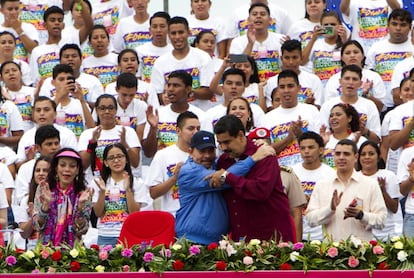Venezuelan opposition says it has verified recall referendum signatures
National Electoral Council has confirmed verification, bringing plebiscite a step closer

Venezuela’s opposition says it has completed the process of verifying the signatures it collected to hold a recall referendum against President Nicolás Maduro.
The National Electoral Council has said it will confirm the data by July 26.
In June, after the opposition collected nearly two million signatures, the electoral council said all those who signed for a recall vote against the 53-year-old president had to return to the polling stations to verify their signatures through fingerprint detection.
The electoral council had rejected more than a quarter of the nearly 2 million signatures collected by the opposition. It requires 200,000 signatures to begin the process.
Maduro has struggled to maintain popularity amid the trouble caused by tight currency and price controls as well as Venezuela's heavy dependence on oil
The opposition MUD coalition has accused the government of sabotaging the process through delays, obstacles and veiled threats.
Nevertheless, opposition leaders, among them two-times presidential candidate Héctor Capriles, say they saw electoral commission documents on Tuesday showing that some 400,000 signatures have been validated, a figure that easily passes the required 1% of registered voters.
If the electoral council considers the signatures valid, it must call a referendum within 90 days.
The next step will require the collection of four million more signatures to call a full referendum.
In order to push Maduro out, more than 7.5 million Venezuelans must vote against him, the number that voted for him in 2013, after the death of his predecessor Hugo Chávez.
Critics say the government is stalling the process at the behest of Maduro himself, who has said that the referendum will not take place this year. Maduro was elected in April 2013 and his term runs until 2019.
For the referendum to be successful, an equal or greater number of voters than those who elected Maduro would have to cast their vote in favor of the recall - he won the 2013 election with 7,587,579 votes.
The timing is important because if Maduro loses a referendum this year, the electoral council would call a new election, which polls indicate he would likely lose. Losing a referendum after January, however, would mean Maduro would be replaced by his vice-president, effectively leaving the Socialist Party in power.
The OPEC country is undergoing a severe economic and social crisis. Food riots and lootings are taking place daily amid shortages of basic foods and triple-digit inflation.
Maduro has struggled to maintain popularity amid the trouble caused by tight currency and price controls as well as Venezuela's heavy dependence on oil.
Sign up for our newsletter
EL PAÍS English Edition has launched a weekly newsletter. Sign up today to receive a selection of our best stories in your inbox every Saturday morning. For full details about how to subscribe, click here
Protests are on the rise and a key poll shows nearly 70% of Venezuelans now say Maduro must go this year.
Maduro has vowed to see his term through, however, blasting opposition politicians as coup-mongering elitists seeking to emulate the impeachment of fellow leftist Dilma Rousseff in Brazil.
The government blames the problems on an "economic war" waged by the opposition with a helping hand from Washington.
English version by Nick Lyne.
Tu suscripción se está usando en otro dispositivo
¿Quieres añadir otro usuario a tu suscripción?
Si continúas leyendo en este dispositivo, no se podrá leer en el otro.
FlechaTu suscripción se está usando en otro dispositivo y solo puedes acceder a EL PAÍS desde un dispositivo a la vez.
Si quieres compartir tu cuenta, cambia tu suscripción a la modalidad Premium, así podrás añadir otro usuario. Cada uno accederá con su propia cuenta de email, lo que os permitirá personalizar vuestra experiencia en EL PAÍS.
¿Tienes una suscripción de empresa? Accede aquí para contratar más cuentas.
En el caso de no saber quién está usando tu cuenta, te recomendamos cambiar tu contraseña aquí.
Si decides continuar compartiendo tu cuenta, este mensaje se mostrará en tu dispositivo y en el de la otra persona que está usando tu cuenta de forma indefinida, afectando a tu experiencia de lectura. Puedes consultar aquí los términos y condiciones de la suscripción digital.








































